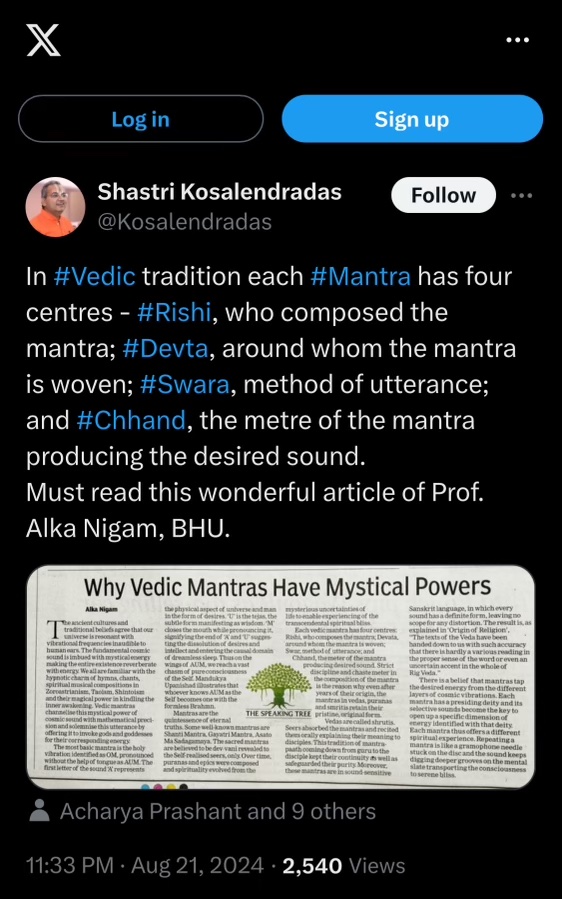This most soothing, most assuring invite in our violently rollicking life comes from Lord Krishna initially given to Arjun, the eternal saadhak in all of us. Part of a shloka this positive declaration appears in Chapter 18 verse 66 in Shrimad Bhagavad -Gita
sarvadharmaan parityajya maam ekam saranam vraja
It is astounding that Gita that is known as the ultimate search for Dharma and grandly opens with the word “Dharmkshetre kurukshetre”, asks to break – off from the clutches of Dharma towards the end of the entire search. In Gita life is a battle- ground between Dharma and Adharma, hence the words occur repeatedly. Generally Dharma is associated with religion. However, when we delve deeper we find this is the oversimplification of the point. All religions acknowledge that “Truth is One” but that One Truth in different religions gets manifested differently. The reason is that in a certain religion certain rules are prescribed by certain enlightened savants followed by certain people. Obviously there pop up multiple, varied understandings to it on various steps. That is why Voltaire who views this One Truth as God adds “whose center is everywhere and circumference nowhere.” Only Dharma has the power to lead us to that One Truth experienced as God. Dharma that comes from the word ‘Dhri’ means that which is worthy to be sustained. It is the “innate order” of things. To let that order happen certain laws are to be performed as duties at gross, subtle and causal levels. Performing these duties that help harmonize the self to connect with the inner core of Being, comes under the umbrella of Dharma. In the luminous pages of Gita, Dharma emerges with this implication.
In human body life -force operates in the ascending order through the seven subtle spiral centers of energy known as chakras. In the lower plexuses, energy sustained by intelligence, feeds the nervous system and flows outwards. This movement fulfils the lesser dharma of duties towards self, family and surroundings but keeps the soul bound to matter – distinct from spirit. When the life-force travels to the higher centers, the self forsakes these lesser concerns and seeks to connect with its essential core. At the Kutastha between the eye- brows, in the stillness of all the movements, the soul unites with the God’s blessed presence. To seek God is the spiritual duty and the highest and the only Dharma of life. In the fire of this yajna of Dharma we offer oblations of all our mortal duties to begin with and ultimately even the spiritual duties. Gradually in the process all the impurities are burned as performed duties have served the purpose of inner cleansing. When the last trace of ego has left we emerge as pure Beings ready to slip into the vast sea of Pure, Blissful Consciousness. But this is not easy. Even for great sages it has been an arduous task to overcome the magnetic temptations of Maya that is dualistic in nature. The Lord tells Arjun to BE A YOGI. He knows that controlling the mind is like protecting the flame of a lamp from stormy winds of desires. Nonetheless, He offers two weapons “abhyasena tu …vairagyena cha”- and shows paths of Karma yoga, Gyan yoga, and Bhakti yoga to take our pick from to begin this spiritual journey. Thus armoured, a spiritual aspirant enters the battle of life which is called Dharmkhetra in Gita. Metaphorically it is a battle of Dharma and eventually has to be won in one life or many lives. The Lord assures that the good karmas of one life are not wasted with the physical death but are transferred into another in the next birth. Once we take refuge in His shelter, the karmas become seedless and the karmic journey ends.
The honey- bee hovers over from flower to flower and keeps buzzing. It becomes silent and still when the honey is collected and gets busy sipping it. Krishna tells Arjun to stop running after the worldly mirage, vanquish all the material and spiritual duties because these have equipped you now to come this far to keep you steadfast in the Kutastha. The battle of Dharmkshetra is won. You are jivanmukhta. Surrender yourself in totality and enjoy the nectar of Supreme Bliss because Bhagwatya krit sarvana/ na kinchidvishyate – after all the worldly tasks offered to the Supreme nothing else to be done remains.

Leave a Reply